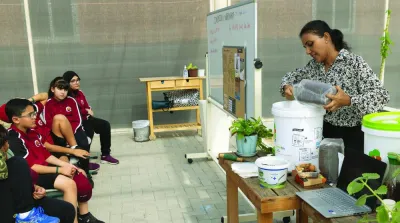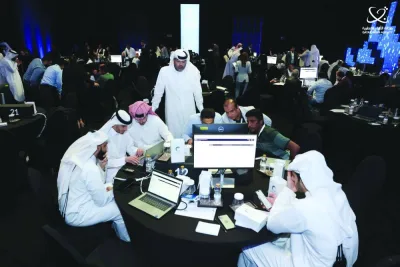The GCC region can help address some of the most pressing challenges facing today, namely food security, climate change and preservation of global bio-diversity, noted Qafco CEO Abdulrahman al-Suwaidi.
He was delivering opening remarks at the 13th annual edition of the Gulf Petrochemicals and Chemicals Association (GPCA) Agri-Nutrients Conference here yesterday.
“Accordingly, the theme of this year’s conference – ‘Sustainable transformation in practice – the future of agri-nutrients’ captures the essence of the discussion we do have,” noted al-Suwaidi, also chairman, of the Agri-Nutrients Committee at GPCA.
The United Nations Sustainable Development Goal 2 is about creating a world free of hunger by 2030.
“The number of people facing hunger and food insecurity has been rising since the SDG was established. Today, statistics are shocking. The UN estimates that approximately 2.4bn people, which represents 29.6% of the world’s population were hungry by 2022.
“As harsh as that fact is, that number could have been higher without agri-nutrients,” al-Suwaidi noted.
He said, “The first priority of the agri-nutrients industry is to help to ensure the world has sufficient amount of healthy food for everyone. However, we must do this in an environmentally-responsible manner. The GCC is home to the world’s leading low-carbon ammonia projects. There is potential to further reduce GHG emissions.”
According to a GPCA analysis, in 2022, GCC agri-nutrient production amounted to 34.6mn tonnes, which represents 16.2% of global production. As global demand for agri-nutrients continues to increase exponentially, the agri-nutrient industry must develop accurate, effective and practically waste-free agri-nutrients to help support global food production and contribute to food security, speakers said.
At the conference yesterday, a keynote address entitled ‘Looking ahead – envisioning the world of agri-nutrients in 2050’ was delivered by Federico Zardi, CEO, Casale SA.
In his opening keynote, Zardi called upon the agri-nutrient value chain to engage in “a co-operative competitive scenario” where healthy competition continues to be the driving force behind innovation and progress, and co-operation among stakeholders contributes to “the greater good”.
Abdulrahman Shamsaddin, CEO, Sabic Agri-Nutrients, and vice-chair, Agri-Nutrients Committee, GPCA, presented the keynote address, in which he detailed Sabic’s 26 years of agri-nutrient innovation.
In a plenary session, Prof Robert Stavins, AJ Meyer Professor of Energy and Economic Development, Harvard University, discussed the challenges and opportunities of climate change and energy transition through video-link.
The opening remarks today will be delivered by Yasser A. Rahim Alabbasi, CEO, GPIC and Board Member, International Fertiliser Association (IFA). He will be followed by John Baffes, senior economist, Macroeconomics, Trade & Investment, World Bank Group, who will present the keynote address. Page 8
He was delivering opening remarks at the 13th annual edition of the Gulf Petrochemicals and Chemicals Association (GPCA) Agri-Nutrients Conference here yesterday.
“Accordingly, the theme of this year’s conference – ‘Sustainable transformation in practice – the future of agri-nutrients’ captures the essence of the discussion we do have,” noted al-Suwaidi, also chairman, of the Agri-Nutrients Committee at GPCA.
The United Nations Sustainable Development Goal 2 is about creating a world free of hunger by 2030.
“The number of people facing hunger and food insecurity has been rising since the SDG was established. Today, statistics are shocking. The UN estimates that approximately 2.4bn people, which represents 29.6% of the world’s population were hungry by 2022.
“As harsh as that fact is, that number could have been higher without agri-nutrients,” al-Suwaidi noted.
He said, “The first priority of the agri-nutrients industry is to help to ensure the world has sufficient amount of healthy food for everyone. However, we must do this in an environmentally-responsible manner. The GCC is home to the world’s leading low-carbon ammonia projects. There is potential to further reduce GHG emissions.”
According to a GPCA analysis, in 2022, GCC agri-nutrient production amounted to 34.6mn tonnes, which represents 16.2% of global production. As global demand for agri-nutrients continues to increase exponentially, the agri-nutrient industry must develop accurate, effective and practically waste-free agri-nutrients to help support global food production and contribute to food security, speakers said.
At the conference yesterday, a keynote address entitled ‘Looking ahead – envisioning the world of agri-nutrients in 2050’ was delivered by Federico Zardi, CEO, Casale SA.
In his opening keynote, Zardi called upon the agri-nutrient value chain to engage in “a co-operative competitive scenario” where healthy competition continues to be the driving force behind innovation and progress, and co-operation among stakeholders contributes to “the greater good”.
Abdulrahman Shamsaddin, CEO, Sabic Agri-Nutrients, and vice-chair, Agri-Nutrients Committee, GPCA, presented the keynote address, in which he detailed Sabic’s 26 years of agri-nutrient innovation.
In a plenary session, Prof Robert Stavins, AJ Meyer Professor of Energy and Economic Development, Harvard University, discussed the challenges and opportunities of climate change and energy transition through video-link.
The opening remarks today will be delivered by Yasser A. Rahim Alabbasi, CEO, GPIC and Board Member, International Fertiliser Association (IFA). He will be followed by John Baffes, senior economist, Macroeconomics, Trade & Investment, World Bank Group, who will present the keynote address. Page 8
 Kokani.me Kokani.me
Kokani.me Kokani.me



